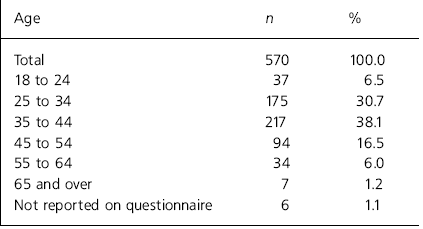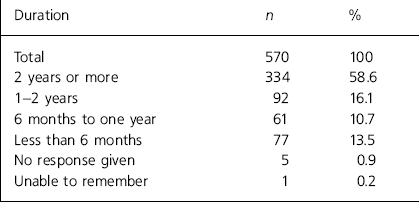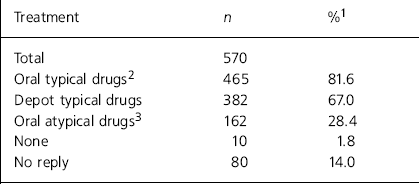Clozapine is an established treatment for schizophrenia that is resistant to therapy with other antipsychotics. It is clearly more effective than conventional drugs in the treatment of schizophrenia (Reference Wahlbeck, Cheine and EssaliWahlbeck et al, 1999) and has unarguable efficacy in treatment refractory illness (Reference Kane, Honigfield and SingerKane et al, 1988). No other drug has been shown unequivocally to have comparable efficacy in this sub-group of patients (Reference FleischhackerFleischhacker, 1999; Reference TaylorTaylor, 1999). Clozapine thus remains the drug of choice in treatment-resistant schizophrenia.
The widespread use of clozapine is very probably inhibited by its acute adverse effect burden (Reference Dev and KruppDev & Krupp, 1995) and by the need for close haematological monitoring. Nevertheless, acute adverse effects are usually manageable (Reference NaberNaber, 1999) and patient satisfaction with treatment, although not widely evaluated, appears to be high (Reference Wolfson and PatonWolfson & Paton, 1996). It might be concluded, therefore, that clinician expectation or observation differed importantly from patient experience and perception.
We sought to evaluate patient perceptions of treatment in a large sample of subjects attending formal clozapine clinics in UK hospitals.
The study
Questionnaires were given to 1284 consecutive patients attending 27 clozapine clinics in the UK during March-May 1999. The patients were asked by their own mental health staff to fill in questionnaire forms by themselves, but were advised to seek help when necessary from the clozapine clinic nurse. Nursing staff were asked only to provide clarification of the questions asked and not to influence patient choice in any way. Completed questionnaire forms were returned by patients before leaving the clozapine clinic. All information was provided anonymously. The questionnaire consisted mainly of questions followed by clearly stated responses, from which patients were asked to choose the one that mostly matched their view. A small number of open questions were included. A full version of the questionnaire is available from the authors upon request.
Findings
Overall, 570 forms were returned (response rate 44.4%). A small minority of forms were incomplete, but all contained part information that has been included in the data analysis. Responses to open questions were grouped by broad category for analysis.
Patient characteristics
Respondents were predominately men (63.3%) and Caucasian (89.5%), but African-Caribbeans (4.9%) and Asians (2.8%) were also represented.
The age of patient respondents ranged from 18 to over 65 years with the majority aged between 25 and 44 (Table 1).
Table 1. Age of respondents (years)

| Age | n | % |
|---|---|---|
| Total | 570 | 100.0 |
| 18 to 24 | 37 | 6.5 |
| 25 to 34 | 175 | 30.7 |
| 35 to 44 | 217 | 38.1 |
| 45 to 54 | 94 | 16.5 |
| 55 to 64 | 34 | 6.0 |
| 65 and over | 7 | 1.2 |
| Not reported on questionnaire | 6 | 1.1 |
Most respondents had been taking clozapine for 2 years or more (see Table 2).
Table 2. Reported duration of clozapine treatment

| Duration | n | % |
|---|---|---|
| Total | 570 | 100 |
| 2 years or more | 334 | 58.6 |
| 1-2 years | 92 | 16.1 |
| 6 months to one year | 61 | 10.7 |
| Less than 6 months | 77 | 13.5 |
| No response given | 5 | 0.9 |
| Unable to remember | 1 | 0.2 |
Previous therapy
Patients were asked to record the medication they were receiving immediately before starting clozapine. Details are given in Table 3.
Table 3. Treatments immediately before clozapine

| Treatment | n | %1 |
|---|---|---|
| Total | 570 | |
| Oral typical drugs2 | 465 | 81.6 |
| Depot typical drugs | 382 | 67.0 |
| Oral atypical drugs3 | 162 | 28.4 |
| None | 10 | 1.8 |
| No reply | 80 | 14.0 |
Perceptions of clozapine treatment
Respondents were broadly favourable in their views of clozapine treatment. When asked to compare clozapine with previous treatment, the overwhelming majority of respondents rated clozapine as being better (62.1% ‘much better’, 24.0% ‘slightly better’). Relatively few rated clozapine ‘about the same’ (9.8%) and a small minority felt clozapine to be ‘slightly worse’ (1.8%) or ‘much worse’ (0.9%) (n=570; 1.4% gave no reply). An open question on the perceived benefits of clozapine treatment revealed that efficacy benefits were most apparent: 35.4% (202 of 570 respondents) cited ‘feeling better’ as something they liked about clozapine. Relatively few (8.4%) cited improvements in tolerability. A similar open question asked patients what it was they did not like about clozapine. Blood tests were most often cited in this regard (24.2%), followed by drowsiness (13.0%) and increased salivation (9.8%). Weight gain was mentioned by only 5.4% of respondents (n=570; 19% gave no reply). A further question evaluated preference for treatment. Overall, 88.6% of respondents claimed that they would prefer to stay on clozapine, with 6.5% preferring previous treatment (n=570; 4.9% did not give a preference). A similar proportion (87.0%) felt that the advantages of clozapine outweighed disadvantages (n=570; 6.5% did not feel advantages outweighed disadvantages, 6.5% gave no reply).
These positive views were reflected in replies to question 14, which asked how patients lives had changed since starting clozapine. Overall, 57% reported finding it easier to mix with people, 42.9% said they now liked socialising, 52.9% had left hospital, 42.9% could now live in a hostel and 7.0% had obtained employment. Only 11.1% reported that their lives had not changed (n=570, 3% gave no reply).
Blood testing
Patients were asked whether or not they knew the reasons for blood testing with clozapine. Most (80.5%) claimed to know the reason for blood testing (17.4% claimed they did not know, 2.1% did not reply (n=570)). Among those claiming to know the reason for blood testing (n=459) 58.6% cited the need to check white cell count as the reason, with a further 10.5% mentioning the need to protect against infection and 2.4% directly citing the danger of ‘neutropenia’. Overall, 6.1% did not give a reason and 12.4% gave the wrong reason. Information on blood testing had been provided by doctors (60.8%, n=459), nursing staff (56.9%), a relative (4.6%) and by a pharmacist (3.7%). Some 85% felt they had been given enough information about clozapine.
When asked for views on regular blood tests, 64% (n=570) claimed to feel that “they're OK - a necessary part of treatment” and a further 4.7% claimed to ‘look forward’ to blood tests. On the negative side, 28.2% claimed that they ‘did not like blood tests much’ or ‘at all’ and a further 1.6% said that blood tests made them want to stop taking clozapine.
Comments
As far as we are aware, this is the largest survey ever conducted of patient perceptions of clozapine treatment. As such, it represents a valuable insight into the experiences and feelings of those taking clozapine.
In the main, respondents were positive in their perceptions of clozapine treatment. Overall, 86.1% of patients claimed to feel better on clozapine than on previous treatments, and a substantial majority felt that the drug's advantages outweighed its disadvantages. Not surprisingly, a similar large majority claimed they would prefer to stay on clozapine rather than go back to previous treatment.
It was also encouraging to discover that most respondents knew the reasons for blood testing with clozapine and that a majority felt indifferent or positive about the necessity for them. However, an important minority of patients claimed not to like blood tests, with a small number stating that blood tests made them want to stop clozapine. Moreover, blood tests were most often given as the aspect of clozapine treatment that respondents did not like.
The large number of respondents in this survey makes more likely the probability that our results are broadly representative of clozapine patients in general. However, our response rate (44.4%) obviously represents a minority of patients surveyed, and our respondents formed something of a select group. All, by definition, were good attenders at clozapine clinics and all felt capable of or motivated to completing the questionnaire. Most were men and Caucasian and by far the majority had been on clozapine for longer than a year. It might be assumed, therefore, that our respondents are representative only of a sub-group of patients who have done well on clozapine and who undergo blood tests only monthly. (Although, an analysis of 77 patients on clozapine for less than 6 months revealed broadly similar attitudes to treatment.) It should also be noted that our questionnaire is not yet validated as a precise tool for evaluating patient perceptions.
In conclusion, in our somewhat select cohort of clozapine patients, clozapine was widely felt by respondents to be more effective than previous treatments. The need for blood tests was viewed negatively by some but, overall, patients expressed a clear preference for clozapine over former therapies. Future research should address perceptions of patients less well established on clozapine undergoing more frequent blood testing.






eLetters
No eLetters have been published for this article.